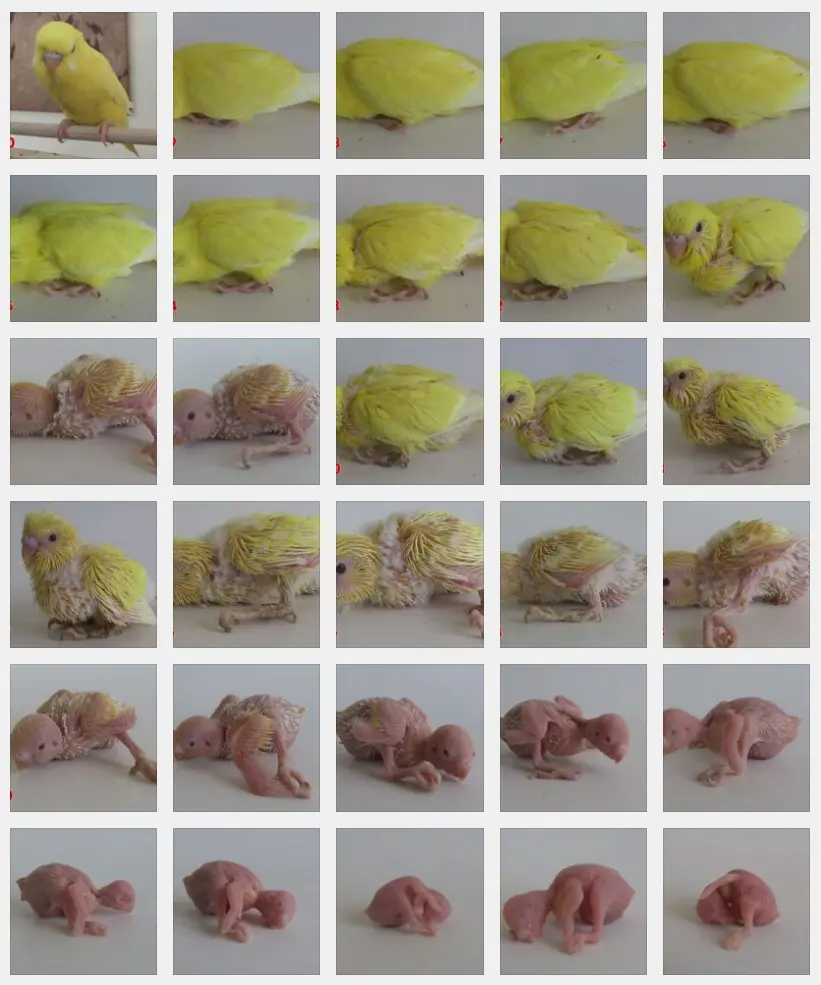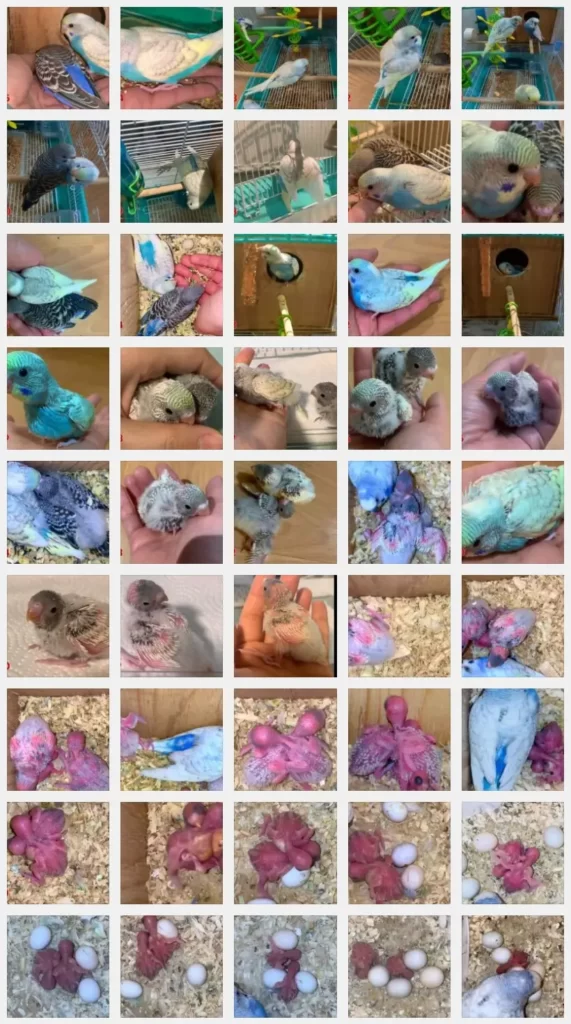Budgies typically leave their nest when they’re between 30 to 40 days old.
However, some budgie chicks, particularly in captivity, might stay with their parents for up to 12 weeks.
Regardless, they’re still juveniles and don’t reach adulthood until they’re about 8 months old.
As a former budgie parent, I understand the worry when your baby budgie seems reluctant to leave the nest.
You might wonder, “How old are budgies when they leave the nest?” This crucial question led me to gather all my knowledge, creating this content to help guide you through this delicate stage of your budgie’s life.
Here, you’ll find insights on typical budgie growth and guidance for those times when your budgie seems to be taking their time.
How Old Are Budgies When They Leave the Nest?
When they are born, budgies are almost entirely featherless.
They might seem vulnerable and weak, but trust me, these tiny creatures are stronger than they appear.
Just after a week, at around seven days old, budgies gain the strength to hold their heads up, a significant milestone in their developmental journey.
By 10 days, their bodies are covered in a soft layer of feather down.
Imagine them as small, fluffy balls, growing a little each day, fueled by the relentless care of their parent budgies.
Following this, around 14 days into their life, they start to grow “pin feathers”, a coarse, pin-like feather covering that signifies the impending arrival of their final feather coat.
It’s at this juncture that the budgie chicks start to exhibit their unique colorings.
Perhaps, as a fellow bird enthusiast, you can share the thrill I always felt when witnessing this transformation.
The budgies are not only developing physically but are also starting to reveal a glimpse of their vibrant personality.
When they reach between 30 to 40 days old, these chicks have fully developed feathers and are prepared to begin their adventures outside the nest.
These initial ventures, often short trips, mark their graduation from nestlings to fledglings.
However, some budgie chicks might need a little more time under the wing of their parents.
In captivity, many owners observe that some chicks wait until they are 12 weeks old before leaving the nest.
Remember, these budgies are still juveniles and won’t reach adulthood until they’re about 8 months old.


What Are the Reasons Why Baby Budgies Do Not Leave the Nest?
Let’s dive a little deeper into the world of budgies and explore why some baby budgies might not leave the nest when we might expect them to.
I have found from my personal experiences, and as indicated in your context, there can be several reasons for this behavior.
One reason could be the pace of their development.
Each budgie chick, much like us humans, grows at its own unique rate.
Some baby budgies might simply need more time than others to become fully independent.
Remember, in the wild, budgies usually leave the nest between 30 to 40 days old.
However, in captivity, some might linger around their parents for up to 12 weeks.
Another important factor is their physical health.
If a budgie chick is unwell or weak, it might delay its exit from the nest.
The chick might feel safer and more comfortable staying in the known confines of the nest, under the protective watch of its parents.
Environmental factors might also play a role.
Budgie chicks might not feel safe enough to leave the nest if the environment outside is stressful or threatening.
This could include factors such as loud noises, the presence of other pets, or even drastic changes in temperature.
What to Do When They Don’t Leave?
Now that we’ve understood why some baby budgies may not leave the nest, the question arises – what should you do if they don’t? Having raised budgies myself, I can assure you, the key here is patience and a healthy respect for the bird’s individual pace.
Firstly, it’s crucial to give the budgie chicks enough time.
As we’ve discussed, some chicks might simply need more time than others to be ready for their first flight.
The budgie will leave when it feels ready, and rushing this process can cause undue stress.
Secondly, ensure you’re providing a safe and comfortable environment for the budgies.
Minimize loud noises, keep other pets away from the budgie’s space, and maintain a consistent, warm temperature in the room.
Lastly, if you suspect that the chick is unwell, it’s important to consult with a veteranarian.
Weakness or illness could delay a budgie’s development, and it’s crucial to ensure they get the necessary care.
Remember, budgies are resilient creatures, evolving from featherless neonates to independent juveniles.
It’s a privilege to be part of their journey and witness their transformation.
Faqs
What is the Developmental Process of Budgie Chicks?
Budgie chicks go through several developmental stages.
They are born almost featherless but by their seventh day, they gain the strength to hold their heads up.
Around the tenth day, a soft feather down begins to cover their bodies, followed by “pin feathers” emerging around day 14.
their adult colorings become visible at this point.
By day 30 to 40, they are fully feathered and ready to leave the nest.
How Long do Budgies Stay with Their Parents in Captivity?
In captivity, budgie chicks might stay with their parents a bit longer than in the wild.
Although they develop feathers by 30 to 40 days old, some chicks might choose to remain in the nest for up to 12 weeks.
They are still considered juveniles until they reach 8 months old.
Can Environmental Factors Impact a Budgie Chick’s Readiness to Leave the Nest?
Yes, environmental factors can indeed impact when a budgie chick is ready to leave the nest.
Stressful or threatening environments, such as loud noises, presence of other pets, or drastic changes in temperature, might delay their departure from the nest.
Providing a safe and comfortable environment can encourage their timely transition.
Should I Be Worried if a Budgie Chick Doesn’t Leave the Nest?
Not necessarily.
Some budgie chicks simply need more time before they are ready to leave the nest.
If they appear to be healthy, showing no signs of illness or distress, it’s best to be patient and give them their needed time.

